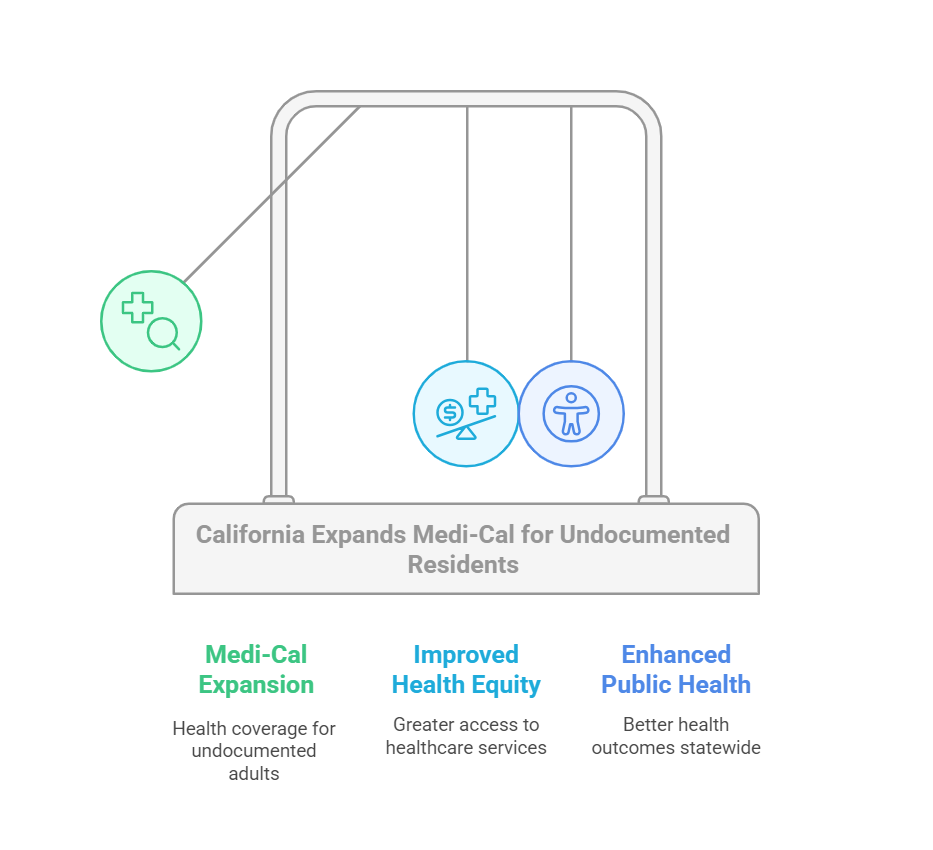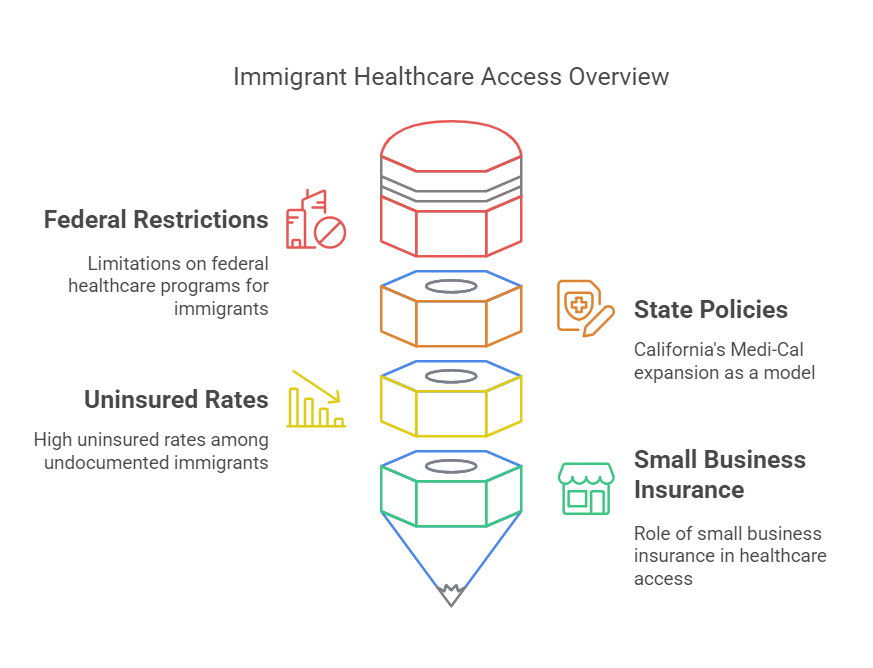California has taken a historic step in healthcare policy by becoming the first state in the U.S. to offer health insurance to all eligible undocumented adults. This expansion of Medi-Cal, the state’s Medicaid program, ensures that low-income undocumented immigrants can access comprehensive healthcare services, marking a significant milestone in the fight for health equity.
The new policy, which went into effect on January 1, 2024, builds upon previous efforts that extended Medi-Cal to undocumented children and seniors. Now, California’s progressive approach to healthcare aims to cover all income-eligible undocumented residents, helping to close a long-standing gap in coverage and improve public health across the state.
At the same time, health insurance for small business owners remains a critical issue. Small businesses must navigate the complexities of securing health benefits for themselves and their employees, much like the challenges faced by immigrants in the U.S. Ensuring accessible and affordable health coverage is essential for economic and social stability. With the right approach, solutions like health insurance for small business owners can bridge gaps and offer sustainable healthcare options for business owners and their employees.

Understanding Medi-Cal Coverage
Medi-Cal is California’s version of Medicaid, a public health insurance program for low-income individuals and families. The expansion means that thousands of undocumented adults who were previously ineligible for full-scope Medi-Cal will now be able to access the same comprehensive healthcare services as U.S. citizens and legal residents.
Services Covered Under Medi-Cal
- Preventive Care – Routine check-ups, vaccinations, and screenings for chronic diseases.
- Primary and Specialist Care – Doctor visits, specialist consultations, and referrals.
- Emergency Services – Access to emergency medical treatment and urgent care.
- Mental Health and Substance Use Disorder Services – Counseling, therapy, and addiction treatment.
- Dental and Vision Services – Routine and preventive dental care, eyeglasses, and vision exams.
- Prescription Drugs – Coverage for a wide range of medications.
- Maternity and Reproductive Health – Prenatal care, childbirth services, and contraceptives.
This expansion aims to reduce health disparities and ensure that all Californians, regardless of immigration status, have access to essential medical services. Additionally, the inclusion of health insurance for small business owners into conversations about accessible healthcare highlights how different regions tackle healthcare accessibility for vulnerable populations. Similar to Medi-Cal, health insurance for small business owners offers critical coverage options, ensuring that those in need receive the medical care they require.
Considerations for California
While California’s decision to expand Medi-Cal is a major victory for health access, several challenges and considerations come with implementing such a sweeping policy:
1. Enrollment Barriers
Despite eligibility, many undocumented individuals may remain uninsured due to language barriers, lack of awareness, and fear of government scrutiny. Outreach efforts will be crucial in ensuring that those eligible understand their rights and how to enroll.
2. Healthcare Infrastructure
With an increase in Medi-Cal enrollees, the state must ensure that healthcare providers can handle the surge in demand. Long wait times, provider shortages, and administrative delays could pose challenges if not addressed properly.
3. Financial Sustainability
Expanding Medi-Cal to all undocumented adults will require significant financial resources. California must develop long-term strategies to sustain funding for the program, ensuring that it remains viable without cutting services or increasing burdens on taxpayers.
Access for Immigrants: A National Perspective
California’s policy contrasts sharply with federal restrictions on immigrant healthcare access. Across the U.S., undocumented immigrants face high uninsured rates, as they are ineligible for federally funded programs such as Medicare, regular Medicaid (outside of state-funded expansions), and health plans through the Affordable Care Act (ACA) Marketplace.
According to research from Kaiser Family Foundation, noncitizen immigrants are three times more likely to be uninsured compared to U.S. citizens due to exclusion from federal healthcare programs and employer-based insurance plans.
By expanding Medi-Cal, California sets a precedent for other states to consider similar policies, potentially influencing national discussions on immigrant healthcare access. Additionally, a closer look at health insurance for small business owners provides insights into how governments and businesses can create sustainable healthcare solutions for underserved populations. The issue of health insurance for small business owners remains a vital discussion as it mirrors the accessibility challenges faced by immigrants in the U.S.

Health Insurance for Small Business Owners
While California expands access to Medi-Cal, small business owners face their own unique healthcare challenges. The phrase health insurance for small business owners is especially relevant in today’s economic landscape, where small enterprises struggle to find affordable and comprehensive health plans for themselves and their employees.
Why Health Insurance Matters for Small Businesses
For small business owners, offering health insurance is essential for:
- Attracting and retaining top talent – Competitive benefits can make businesses more appealing to skilled workers.
- Ensuring employee well-being – A healthy workforce is a productive workforce.
- Reducing absenteeism and turnover – Access to medical care helps employees stay healthy and engaged.
- Gaining tax advantages – Many health insurance premiums are tax-deductible.
Despite these advantages, small business owners often face high costs, administrative challenges, and complex policy options when choosing the right plan.
Finding the Right Coverage
To navigate the complexities of health insurance for small business owners, many entrepreneurs turn to intermediaries like PEO4YOU. Companies like PEO4YOU help small businesses find, compare, and enroll in suitable healthcare plans, taking the burden off business owners while ensuring their employees receive quality coverage.
The Role of PEO4YOU in Healthcare Solutions
PEO4YOU is a trusted intermediary that connects clients with affordable, high-quality health insurance plans. By working with multiple insurance providers, PEO4YOU ensures that businesses and individuals can find plans that suit their needs without unnecessary complexity.
For small business owners, PEO4YOU offers a range of benefits, including:
- Access to group health plans – Providing coverage for employees at affordable rates.
- Customizable benefits – Offering medical, dental, vision, and life insurance.
- Nationwide consistency – Ensuring stable pricing across different provinces.
- Expert guidance – Simplifying the enrollment process and compliance requirements.
By working with PEO4YOU, small business owners can secure comprehensive health insurance for small business owners, ensuring both their own well-being and that of their employees.
Final Thoughts: Advancing Healthcare Access for All
California’s expansion of Medi-Cal to all eligible undocumented adults is a landmark policy that reinforces the state’s commitment to health equity. While challenges remain, the program paves the way for broader healthcare access across the nation.At the same time, health insurance for small business owners continues to be a crucial issue. With rising costs and complex regulations, small business owners must explore solutions like PEO4YOU to secure reliable healthcare coverage.







